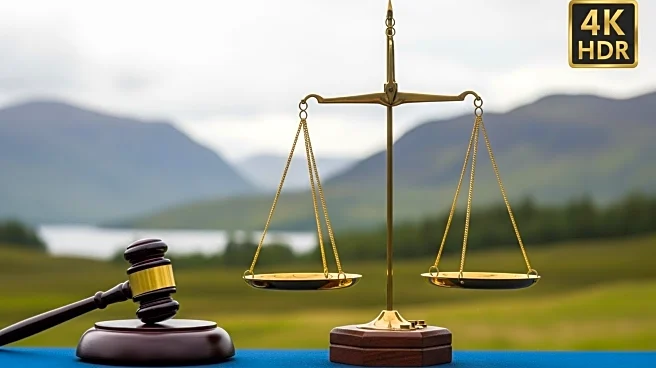What's Happening?
Two individuals have been arrested on suspicion of immigration offences after a group calling itself the 'Kingdom of Kubala' was evicted from a forest near Jedburgh, close to the England-Scotland border. The group, which had been camping in woodland since May, claims to represent a self-declared African tribe reclaiming land allegedly taken from their ancestors 400 years ago. The trio includes Ghanaian national Kofi Offeh, who styles himself as 'King Atehene'; his wife Jean Gasho, a US citizen who goes by 'Queen Nandi'; and Kaura Taylor, referred to as 'handmaiden Asnat'. Initially camping on private property, they were served an eviction notice in August and later moved to a neighbouring plot owned by the Scottish Borders Council, prompting legal action. On Wednesday, Selkirk Sheriff Court ruled that the group could not return to the original land. The following day, officers from Immigration Enforcement and Police Scotland visited the site, where two members of the group were taken into custody.
Why It's Important?
The arrest of the self-proclaimed 'Kingdom of Kubala' members highlights ongoing challenges related to immigration enforcement and land rights disputes in the UK. This incident underscores the complexities faced by authorities in managing unauthorized settlements and enforcing immigration laws. The group's actions have drawn attention to issues of land ownership and historical claims, which can complicate legal proceedings and community relations. The case also raises questions about the influence of self-styled groups and their impact on local governance and law enforcement. The Scottish Borders Council's involvement reflects the need for coordinated efforts between local authorities and national agencies to address such situations effectively.
What's Next?
The ongoing investigation by the Home Office and local authorities will likely focus on the legal status of the individuals involved and the legitimacy of their claims. Further legal proceedings may ensue, potentially involving deportation or other immigration-related actions. The case may prompt discussions among policymakers regarding the handling of similar situations in the future, including the balance between respecting cultural claims and enforcing legal standards. Local communities and advocacy groups may also engage in dialogue about the broader implications of such incidents on social cohesion and cultural recognition.
Beyond the Headlines
This incident may have broader implications for discussions on cultural identity and historical land claims. It highlights the tension between modern legal frameworks and historical narratives, which can influence public perception and policy decisions. The case could spark debates on the recognition of self-proclaimed groups and their rights within established legal systems. Additionally, it may lead to increased scrutiny of immigration policies and their impact on diverse communities, potentially influencing future legislative changes.









